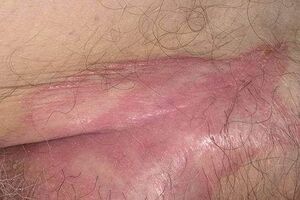Psoriasis is one of the most serious skin diseases. Pathology is of an incurable nature of autoimmunity and occurs in patients of all ages. A characteristic of the disease is its wavy nature. After relapse, there is a period of calm, and vice versa. The duration of remission always depends on the type, form, and individual characteristics of the patient.

The main symptoms of psoriasis are unpleasant pink or red spots that appear on various parts of the body. In medical practice, this type of rash is usually called a plaque or papule. In most cases, the plaques are covered with pathologically characteristic scales and rise a few millimeters above the surface of healthy skin. In addition, the signs of psoriasis include itching and inflammation in the affected area.
The cause of psoriasis has not been identified, and every tenth of skin problems will be diagnosed by a consulting doctor. Pathology is prevalent mainly in adults, but is usually found in children. Dangers faced by residents of countries with cold and humid climates. The prevalence of cold countries is higher than that of residents living in warm climates.
What is psoriasis: the theory of the origin of the disease
So far, it has not been possible to pinpoint the cause of the disease, nor is it clear how psoriasis started. Even the joint efforts of scientists around the world cannot answer the question of why psoriasis occurs? According to Wikipedia, in modern medical practice, there are several theories about the occurrence of this disease. However, none of them have been officially backed up. Theories of psoriasis development include:
- Immunity.
- Hereditary.
- Hormone destruction theory.
- Theory in the context of stress.
- Abnormal metabolic process.
- The origin of the virus.
Based on clinical research and laboratory data, scientists can identify several reasons that may lead to the development of pathology.
Immunity Theory
Many scientists use the characteristics of the immune system to determine the cause of psoriasis in children and adults. This theory is by far the most extensive. From the point of view of its creator, plaques of different nature appear due to the activity of immune cells, which see certain areas of the dermis as attackers. The result is intense inflammation and redness of the skin.

From the perspective of immune theory, the causes of psoriasis in the body are as follows:
- Rub the skin with clothes and shoes;
- was burned;
- Frostbite;
- Micro cracks;
- Scratches.
According to the test results, it can be determined that there are a large number of immune cells where the psoriasis spots appear. This is a partial confirmation of the immune theory.
Genetic Theory
Another name for it is genetic theory. Many scientists believe that the disease is hereditary. Many opinion polls have proved this, and the results show that if the mother has a pathological disease, the risk of the child is 20% to 25%. If both parents have psoriasis, the percentage rises to 75.
Genetic susceptibility is considered to be one of the main factors in disease development. Combined with a variety of predisposing factors, pathological risks increase significantly.
Important! If the child’s parents suffer from psoriasis, there is no guarantee that the child will suffer from the same disease. Heredity only increases the risk of this disease.
Endocrine Theory
Endocrine theory also partially explains the causes of psoriasis in the hands, back, head and other parts of the body. Here, scientists believe that hormonal imbalance in the body leads to pathological changes in the dermis. The normal dysfunction of the endocrine system causes a decrease in the healthy life activities of dermal cells.
Hormonal imbalance may occur due to the following reasons:
- pregnancy period;
- Menstruation;
- Taking hormone drugs;
- Puberty.
Important! According to the results of medical research, no violation of the patient's blood hormonal level was observed in all cases. In view of these facts, the endocrine system cannot be considered basic.
Neurogenesis Theory
The onset of psoriasis also supports neurogenic theories. This view explains the emergence of diseases due to stress and strong emotional experiences. Representatives of this theory believe that the cause of psoriasis may be the dysfunction of the central nervous system.

According to experience, patients will experience vascular wall neurosis and other phenomena. This causes narrowing of blood vessels and muscle tissue and impaired blood flow. The result is a rash in the form of scaly patches appearing on the body.
According to the survey, more than half of all psoriasis patients have extensive experience and stress before the onset of the disease.
Exchange theory
The cause of psoriasis in men and women may also be the destruction of metabolic processes in the body. This is the viewpoint represented by the theory of metabolic disorders.
Medical research has found a clear connection between psoriasis and metabolic disorders in the body. Violation of lipids and other processes can lead to changes in blood composition, weakened immunity and other negative consequences.
The following factors can cause metabolic disorders:
- diabetes;
- Kidney, liver disease;
- Unbalanced diet;
- Sedentary lifestyle.
Virus Theory
Some scientists explain the cause of psoriasis through the transfer of viral infection or the presence of chronic inflammation in the body. This theory is related to genetics to some extent. Representatives of this view believe that infection can become a driving force for pathological development.
What factors can trigger psoriasis?
In addition to the theory of the origin of the disease, there are several heinous factors. These include:
- Unhealthy diet, food allergens, insufficient vitamin and mineral content.
- Bad habits, such as tobacco and alcohol, drugs.
- Wrong ingestion or failure to cancel medication in time.
- The leather has suffered various injuries.
- Hormonal imbalance in the body.
The combination of heredity and several predisposing factors may cause diseases such as psoriasis. It is very important to diagnose the pathology in time and start appropriate treatment. This will help avoid many negative effects in the future.
Why psoriasis is dangerous
First of all, the disease may not cause much discomfort, but if left untreated, the disease will become very serious and will continue to recur. Therefore, it is important to start treatment in time to prevent the occurrence of psoriasis. As a preventive measure, you can use traditional medicine and its methods, but you must get the consent of your doctor.
Now that you know the cause of psoriasis, you need to start treating it. Consult your doctor when symptoms first appear, self-medication can seriously damage your health.























